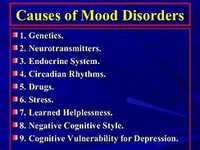
MOOD DISORDERS
FOODS THAT HARM
FOODS THAT HEAL
FOODS TO LIMIT
WHO’S AFFECTED
The term mood disorders describes basic forms of mental illness, including different types of depression, such as postpartum depression and dysthymia; bipolar disorder, characterized by mood swings that range from depression to mania; and seasonal affective disorder (SAD), in which people are sad and moody throughout the winter months
Nutrition Connection
While the links between diet and mood disorders are not firmly established, there has been a lot of research on the effects of certain foods and nutrients on the brain chemicals that control your moodThe following are general tips: Consume more tryptophan
The amino acid tryptophan is used by the brain to produce serotonin, which is believed to influence mood
Food sources include turkey, milk, and eggs
Add more carbs
Meals that are especially rich in carbs have been associated with a calming, relaxing effect
Carbohydrate-rich foods allow tryptophan to enter the brain
Feel-good food choices include pasta, breads, grains, cereals, fruits, and juices
Lean on leafy greens
Many depressed people are deficient in folate
This essential mineral is abundant in green leafy vegetables like kale
Other sources include orange juice, lentils, corn, asparagus, peas, nuts, and seeds
Feast on fish
Aim to eat fish three times a week or more
Researchers found that people who ate fish less than once a week had a 31% higher incidence of mild to moderate depression than people who ate fish more often
Limit caffeine
The best-known mood-altering dietary item is caffeine, a stimulant found in coffee, tea, colas, and chocolate
While a cup of coffee may be a welcome eye-opener, too much caffeine causes palpitations, sleeplessness, and anxiety
Limit or avoid alcohol
Second to caffeine as the most often used mood-altering substance, alcohol is a depressant that slows down certain physiological processes
Because alcohol also interferes with sleep, it can cause irritability, anxiety, and depression
Don’t skip meals
Besides the types of food you eat, when and how much you eat can also affect your mood
Eating small amounts of food frequently through the day can keep your energy levels and mood more constant
50
9% of those with mood disorders in the U
S
are receiving treatment
Limit sugary foods
Foods made with refined sugar may have some effect on children’s activity
Refined sugars enter the bloodstream quickly and produce high glucose levels that trigger adrenaline, followed by a sugar “crash
”
Beyond the Diet
A combination of medication and therapy works best to address mood disordersThe following are general recommendations: A NOTE ABOUT FOOD
ALLERGIES
There is no evidence that foodAllergies
, including the much-disputed “yeast sensitivity,” cause emotional or behavioral changesIn some rare cases, children do have intolerances to certain food additives and these can manifest as behavioral problems
Discuss your questions with your pediatrician
See a doctor
If you suspect that you have a mood disorder, talk to your doctor
He or she may be able to prescribe medications or refer you to a psychotherapist
Soak up some light therapy
For those who experience SAD, light therapy or phototherapy can be effective
Ask about medications
If any mood disorders are severe, a doctor may prescribe antidepressants, such as sertraline, paroxetine, or fluoxetine, among others
Those suffering from bipolar disorder may be prescribed mood stabilizers, such as lithium, anticonvulsants, antipsychotics, and antianxietry drugs
Look into psychotherapy
Therapies such as cognitive behavioral therapy, family therapy, and group therapy may help an individual and his or her family better manage the disorder
Also, electroconvulsive therapy may be an option
Importance of well balance diet




